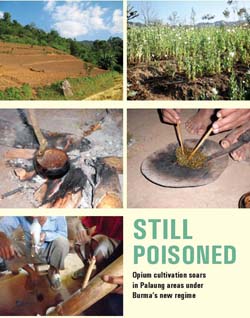A new drug report released today by the Palaung Women’s Organization illustrates concerns within the Palaung region of Shan State North that the production of opium, encouraged by elected official and kingpin ‘Panhsay’ Kyaw Myint, has brought addiction and crime to the already troubled region.
 The report said “‘Pansay’ Kyaw Myint’s victory as Union Solidarity and Development Part candidate in a November 2010 election was fueled by both voter fraud and bribes.”
The report said “‘Pansay’ Kyaw Myint’s victory as Union Solidarity and Development Part candidate in a November 2010 election was fueled by both voter fraud and bribes.”
It has been reported that one of Kyaw Myint’s campaign promises was to allow the cultivation of opium by farmers for five years without punishment.
In the past, many villagers in Palaung had relied on the production of tea for their livelihood. However, with the current government regime’s total control over economy in the region, the falling prices of tea have forced many into opium production out of desperation.
With this increase in production throughout the region, many male villagers have turned to the use of opium as a means of escaping their troubled lives.
With the increase in use of opium, the region has been victimized by the secondary problems often associated with addiction- theft, violence, the destruction of the traditional family structure.
The much-vaunted filed destruction campaigns are criticized in the report. “We must pay (the destruction team) 15,000 Kyat ($18.75) per household (to ensure the security of our crops),” said a male villager.
As a result only 96 hectares (10.8%) out of the 892 hectares cultivated were destroyed in the 2009-2010 season and only 226 hectares (19%) out of 1,189 hectares cultivated were destroyed in the 2010-2011 season, says the report.
It also charges the UN Office on Drugs and Crimes (UNODC) as relying too much on data from the Burmese regime. For example, it reported finding 1,600 hectares of opium fields across 23 townships in northern Shan State in 2009. PWO however found 617 hectares of opium fields in just one township alone. “(The UNODC needs) to improve the accuracy of its data by working directly with people in the communities,” it says.
The PWO, based in Maesot, is known for its highly successful previous reports: Poisoned Flowers (2006) and Poisoned Hills (2010).


